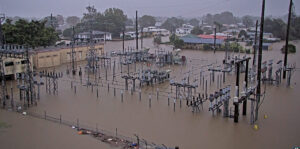As opposition leader Tony Abbott told us that emissions trading was an expensive fraud. As Prime Minister he is proposing changes to his direct action policy based on the assumption that trading pollution permits is both cheap and reliable. As with so much of the modern policy debate the explanation for this remarkable turnaround has everything to do with politics and nothing to do with policy.
Rarely one to hide behind vague words, the Prime Minister once described the buying and selling of international pollution permits as “a so-called market in the non-delivery of an invisible substance to no one”. And he described the cost of having to purchase such permits as equivalent to putting a wrecking ball through the Australian economy.
But those views are so 2013. Last week it was announced that under the so called “direct action” policy companies whose emissions increase will be able to purchase offset credits from companies overseas for the “non-delivery of an invisible substance”. That is, companies who do not want to engage in direct action will simply be able to pay for credits from overseas companies or organisations who do. Just like an emissions trading scheme.
Many of the same business groups that raged against the ALP’s emissions trading scheme are publicly appreciative of the Prime Minister’s backflip on imported pollution permits for the simple reason that such permits are so cheap. EU permits are currently trading at about $A13 per tonne. More of a nerf ball than a wrecking ball.
Leaving aside the symbolism of yet another backflip from a government that promised stability, the decision by the Abbott government warrants closer examination than it has received as it cuts to the heart of the question of; what is the objective of Australia climate change policy?
RADICAL REDESIGN OPTION
Some purists might think that the objective of Australia’s climate change policy is to prevent dangerous climate change. However, eight years after John Howard lost office, both parties remain committed to emission reduction targets that don’t come close to what the climate scientists say is needed to avoid more than 2 degrees of warming, let alone the 1.5 degrees that many scientists and Pacific Island states say is actually needed. Put simply, both the government and the opposition claim to accept the scientist’s diagnosis of the climate change problem but neither will commit to taking the dose of medicine those same scientists say we need.
Another possible objective for climate change policy is to radically redesign our economy to both cope with, and take advantages of, the fundamental changes that achieving the stated G7 objective of decarbonising the global economy will present this century. You don’t see much evidence of that in an Australia whose Prime Minister is desperate to build the largest export coal mines in the world.
A third possible objective for climate policy is that we simply want to muddle along doing as little as possible and hope that the recent 32 per cent reduction in China’s demand for coal imports is a blip. Or that the Indian Energy Minister’s statement that he wants coal imports to fall to zero in three years is just an Abbottesque rhetorical flourish. This is where imported pollution permits come in.
At current market prices, and in the short term, buying imported pollution permits is much cheaper than investing in renewable energy capacity or building the kind of public transport systems that keep global cities liveable and productive. In turn, for those who see the objective of climate policy as being to provide the appearance of action where these is none, imported pollution permits are the perfect vehicle. They allow us to set emission reduction targets and do nothing about achieving them.
Back when simply attacking the carbon tax was enough to provide Mr Abbott with a lead in the polls he declared: “Ever since Copenhagen, it’s been absolutely obvious that the world is not moving towards taxes – whether they’re fixed taxes or floating taxes. The world is moving towards the kind of direct action measures to improve the environment, which the Coalition has long championed.” He was right.
China, Germany and the US are making massive investments in renewable energy. New efficiency standards for everything from appliances and houses to coal-fired power stations are being introduced around the world and a growing number of countries are supporting President Tong of Kiribati call for a moratorium on new coal mines.
But just as the time for some real direct action is required, the Prime Minister has decided that paying others for the non-delivery of an invisible substance is the best way forward. The only consistent theme in Australian climate policy is the desire to do as little as possible, while pretending otherwise, of course.
Richard Denniss is chief economist at The Australia Institute. @RDNS_TAI
Related documents
Between the Lines Newsletter
The biggest stories and the best analysis from the team at the Australia Institute, delivered to your inbox every fortnight.
You might also like
Climate crisis escalates cost-of-living pressures
A new report has found direct connections between the climate crisis and rising cost-of-living pressures. Failure to lower emissions now will only aggravate the crisis, with each moment of inaction compounding the pressure on households.
Ensuring workers’ safety in the climate crisis
As I watched the fires in Los Angeles unfold in January this year, my mind of course reflected on the 1999-2000 Black Summer bushfires in Australia. Both these seasons have wrought significant damage to humans and other animals, and to land, infrastructure and property. There has been a huge personal, collective and financial toll involved.
The kind of hypocrisy that has become so normal in Australian politics it almost slips past unnoticed
Governments say the right things about becoming a ‘renewable energy superpower’ and committing to net zero. But they keep approving new coal and gas projects as if the laws of physics don’t apply to Australia.



